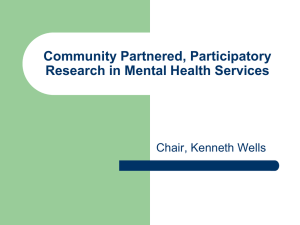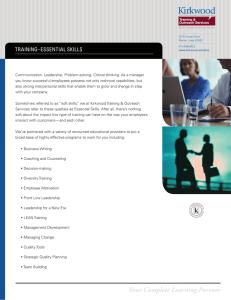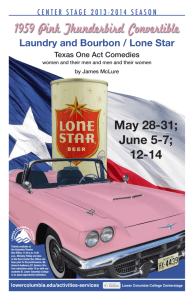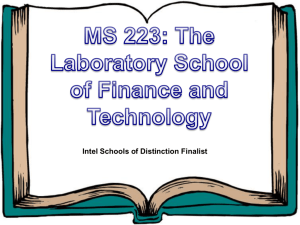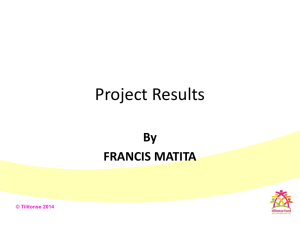Document 14359464
advertisement
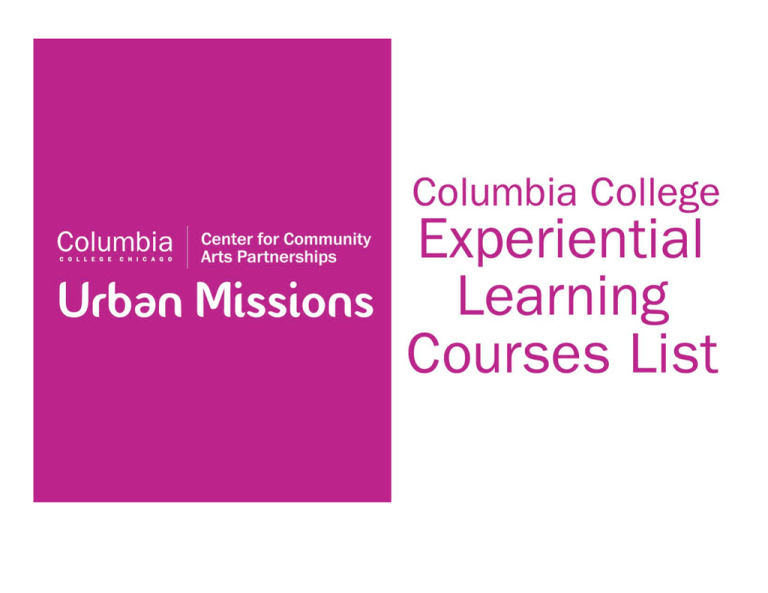
U.S Foreign Policy- 50-1302 Course analyzes various internal and external factors that influence formulation and execution of U.S foreign policy. Content examines the crucial role of U.S foreign policy and its importance and implications both for the U.S and other countries. Through discussion of past and present major international problems and policy decisions, current foreign policy of the U.S is examined in terms of historic actions, political ideas and consequences. ***Partnering High School / CBO students are invited to join Columbia students as they present and discuss US Foreign Policy together. Columbia students offer perspectives on what it is like to be a college student, explain US Foreign policy and why it is important, and present on topics they have studied throughout the semester. Guest speakers have included US Ambassadors, members from the Chicago Consular community, and representatives from Egypt / Morocco. U.S. Foreign Policy has partnered with Steinmetz and Chicago Academy High Schools. Oral Expressions: 52-1401 Students overcome difficulties they may have in public speaking, such as stage fright and poor diction. Students are made aware of important elements such as delivery and posture, use of gestures, and good grammar. Course introduces students to informative, persuasive and occasional modes of public speaking and helps students develop well-organized and purposeful speeches. ***Partnering High School / CBO students are invited to join Columbia students as they present on topics such as how to be successful in college, how to apply, tips for college, etc. Oral Expressions has partnered with Sullivan High School. The Television Producer: 40-2201 Course introduces the students to the duties of the television producer, focusing primarily on the producer’s role in creating different types of programming. We will explore relationships with the production team, the director, writers, and the studio. Main goals include individual development in areas of problem solving, prioritization, team building, and scheduling for a successful project. The roles of the producer in all phases of the production will be emphasized. ***Students in the Television Department are partnered with a Community Based Organization (CBO) to write/direct and produce a commercial which will be used by the CBO for advertising/informational purposes. TV Producer has worked with Puerto Rican Arts Alliance (PRAA). You can see their final product here: https://www.youtube.com/watch?v=8ob8LQvEukk Documenting Social Injustice: 40-3340 This course combines social justice education with a practical exploration into the role new technologies can play in media activism. Students will become familiar with a range of social justice issues through media examples, assignments, research, and class discussion. By mid-term, each student will propose his or her activist media project that supports a specific social justice cause in a well researched, passionate, and persuasive presentation to the class. Students will have the opportunity to partner with a community-based organization, learning how to create advocacy media in a real world situation. Crews will work on a short doc, PSA, crowdfunding site or social media outreach plan, learning how to use transmedia to help create policy change, mobilize people to create change, and promote discussion. ***Students are partnered with a Community Based Organization (CBO) to produce a PSA documenting social injustices relevant to the CBO’s mission. This course has partnered with CLAIM (Chicago Legal Advocacy for Incarcerated Mothers) to create a PSA for its “Benevolent” crowd funding and social media campaigns. Theater Practicum: 31-2950 This course will engage students in the theory and practice of teaching theatre to youth. The class meets twice a week. Students will spend one class studying teaching fundamentals: classroom management, curriculum development, lesson planning, and assessment as they relate to the teaching performance skills. The other class will be spent in practice in a youth theatre program in the Chicago area. Students will teach and observe each other’s teaching in an established, ongoing youth arts program. ***Students in the Theatre Department are partnered with a High school/ CBO to gain a solid understanding of teaching artistry and put theory into practice by working together as a teaching ensemble. Theater Practicum has partnered with Perspectives Charter School IIT to train students in scriptwriting and performance within an ensemble. Percussion Ensemble: 32-2830 This course involves a performance ensemble, which is made up entirely of percussion instruments of both definite and indefinite pitch. Course develops sight reading ability and ensemble skills and may be repeated three times for credit. Enrollment in this ensemble requires concurrent registration in private lessons. ***Students from the Music Department are partnered with a Community Based Organization to perform and teach community youth the art of percussion. Percussion ensemble performs at the Dia de Muertos processions with ElevArte Community Studio. Students have also taught the art of percussion to students at Ruiz elementary, who have also joined in the community procession. Ad Agency: 54-3978 Course teaches students how to function in an advertising agency as a specialist (account managements, creative, media, traffic, production) and as a member of an agency team, students work with actual clients in real assignments and are required to participate in client meetings, generate contact reports, conduct research, develop strategies, write media plans, ideate concepts, and produce creative elements. Course culminates in the final production of completed marketing campaign elements, enabling students to have published samples for their portfolios. Prerequisites: Completion of Marketing Communication core courses and permission of instructor after an interview (to ensure a balance between account and creative specialties, diversity, and the appropriate skill level) ***Students are partnered with a Community Based Organizations to develop marketing campaigns specific to each CBO client. Ad Agency has worked with Project Brotherhood, Association House, Teatro Americano, Matli Dance Academy, and Access Living. Campaigns for these CBOs have produced PSAs, posters, TV commercials and radio spots providing students with published work for their portfolios. Interactive Advertising Campaign Development: 54-2606 In this elective course, offered and taught jointly by Interactive Arts and Media and the Marketing Communication Department, students will develop interactive advertising campaigns for select products/services. This course will challenge student teams from each department to conduct research, develop strategies, create concepts and produce digital campaigns. At the culmination of the course, students will formally present their fully developed interactive campaigns and will have produced work for their portfolios. ***Students are partnered with a Community Based Organization to develop a marketing campaign specific to each CBO client. Interactive Advertising Campaign Development has worked with NeighborCarts, E.A.T. Chicago, and Taste Buddies. Campaigns for these CBO clients have produced Social Media plans, interactive websites, and educational characters for community youth. An example of work produced for NeighborCarts can be found here: http://iam.colum.edu/students/stacy.deluca/neighborcarts/index.html Writing and Rhetoric I: 52-1151 Writing and Rhetoric I helps students understand and refine their own writing processes. Designed to assist students in making connections between their knowledge, cultures, worlds, and the multiple-literacies and discourses of academic, communicative and performing life, the course encourages students to develop their distinctive voices as they learn to make conscious rhetorical decisions. Writing and Rhetoric I connects personal reflection with critical analysis, providing plentiful and varied opportunities for writing, strengthening reading skills, and becoming a member of a writer-reader community. ***Students are partnered with a Community Based Organization (CBO) to advocate and raise awareness for a social justice issue in the city of Chicago. Writing and Rhetoric partnered with the Chicago Coalition for the Homeless to provide audience for formerly homeless speakers, making flyers for petition, collecting signatures for petition, making presentations, writing letters and blog material for this CBO. Radio Workshop: 41-3500 This service-learning course involves students in community outreach to identify significant community problems, issues and needs and how these areas are addressed by public service programming. Students create a radio public affairs issue fact sheet on the non-profit group and produce issue related public service announcements for broadcast on WCRX, the Columbia College radio station, and local commercial stations. This class also covers critical Federal Communications Commission (FCC) rules and regulations as they relate to the radio station public file. ***Students from the Radio Department are partnered with a Community Based Organization (CBO) to create a radio public affairs issue fact sheet and produce issue-related public service announcements to broadcast on WCRX, the Columbia College radio station, and local commercial stations. Radio Workshop partnered with Archi-Treasures to produce a 30 and a 60 second public service announcement. People Power and Social Media: 41-2115 This is a problem-solving course utilizing current events for inquiry, reflection and the practice of civic responsibility. This course combines opportunities for students to collaborate in groups to research an issue, develop concentrated knowledge on a topic, encourage creative and critical thinking and following up by voicing their opinions for actions utilizing social media. Students will also engage with a selected non-profit group (identified in collaboration with the Center for Community Arts Partnerships) to produce an issue specific podcast and/or blog independently or on the website of the non-profit group. ***Students are partnered with a Community Based Organization (CBO) to produce an issue specific podcast/or blog independently or on the website of the CBO where they will share their concerns and knowledge with people around the world. Students decide upon an issue, research the topic and participate in group discussions (with a little bit of roleplaying). Students utilize multiple media platforms and the Internet to become better informed and learn about the various perspectives of the issue. Writing for Managers: 28-2120 The course emphasizes the importance of professional written communication for artists, entrepreneurs, and managers in today’s arts, entertainment and media environment. The course focuses on identifying the most appropriate media and format for reaching target audiences and achieving intended communication goals. It also provides students with the essential tools and skills to organize and effectively convey information in a clear and concise manner. This course fulfills Columbia College’s writing intensive requirement (WI). BIGart J-Session: 38-1581J BIGArt J-Session provides first-year students an introduction to the professional field of teaching artistry. After learning about the field and context of arts education as a whole, we will enter the field to serve as a teaching artist; Columbia students will work directly with young people in classroom and community organization settings on collaborative art projects. The end result of the course will be portfolio that documents the learning process and the outcomes of the project; we will also host a showcase for the Columbia College Community to share our work after J-Session concludes. This course also provides an introduction to (and applicable credit towards) a Teaching Artist minor. ***First year students are partnered with a Community Based Organization (CBO) to provide an arts making workshop with community youth. Big Art has partnered with ElevArte Community Studio to help paint the faces of community members attending their annual Dia de los Muertos celebration. Students also facilitate and participate in the community procession. Gallery Management Practicum: 28-4020 This practicum course provides hands-on gallery management, exhibition, curatorial, and design experience for students of all majors. Known as The Hokin Project, this course presents the work of the Columbia College Chicago community through exhibitions, programs, and events in the Hokin Gallery. Gallery Management Practicum is a student-run collaboration of the Arts, Entertainment & Media Management Department (AEMM) and Student Affairs / Department of Exhibitions and Performance Spaces (DEPS). ***Students in the Business and Entrepreneurship department partner with local/international artists to curate a show in the Hokin Gallery. Student have partnered with Robert Karimi/The Peoples Cook to curate an interactive art exhibit and plan pop up performances Introduction to Management: 28-1110 In this course students learn the basic management functions of planning, organizing, leading and controlling, as they explore their opportunities as future arts managers and entrepreneurs. Using text, activities, films, cases and projects, students deepen their understanding of the role of the arts manager; practice applying management skills, tools, and techniques; and identify ways to effectively and creatively respond to management problems and challenges. ***Students from Columbia’s Business and Entrepreneurship department have partnered with True Star to research and present recommendations for a crowd-funding campaign. Recommendations included marketing for True Star’s different sets of stakeholders, branding, social media strategies, video, and internship possibilities. Information Management: 28-1113 This course provides students with a practical framework for employing essential computer applications in today’s business environment. Students apply advanced functions of database, spreadsheet, word processing and presentation software to business analysis and decisionmaking processes. The skill set pursued in this course is fundamental to effective managerial operations of a variety of arts, entertainment and media businesses and organizations. ***Students from Columbia’s Business and Entrepreneurship department have partnered with Residence Association of Greater Englewood to tabulate and analyze survey data from their ‘So Fresh Saturday’ events from Summer 2014 and Summer 2013. Students presented recommendations to R.A.G.E. for future data collection. Team Development: 36-2602 This course offers an introductory look into the collaborative process in the interactive field. Students will learn about the roles in interactive team development, how to effectively manage time and project scope, how to set and meet deadlines, and how to work as a group to deliver user-centered projects. *** Students from Columbia’s Interactive Arts & Media department have partnered with Chicago Public Art Group to develop a better user experience for CPAG’s online presence. Products include an interactive mural map, brochures, and a social media guide. Event Management: 28-4090 This course is designed to provide resources, tools, and training necessary for planning and management of live events. Students are given hands-on orientation of event management processes and the opportunity to participate in managing actual events. *** Students in the Business and Entrepreneurial Dept. have planned and implemented a fundraising event to raise money for the Center for Community Arts Partnerships. Decision Making for Fashion Business: 27-3970 This required course that must be taken by graduating students during their final semester. Course applies previously learned fundamentals of critical business decision making that are necessary in developing a competitive edge in today’s fashion/retail business market. Students work with a mentor in the professional field and develop a merchandising package or business strategy that will be presented to industry professionals. *** Students from Columbia’s Fashion Department have partnered with True Star Magazine to develop and implement a three page fashion spread, write-ups for the magazine and a photo shoot for stock photos. Business of Visual Art: 28-1270 This course investigates a broad range of visual arts institutions, organizations, and businesses, including museums, commercial galleries, non-profit and alternative venues, auction house and art fairs. The course includes site visits and meetings with professionals to provide an inside look at how these arts businesses operate and to expose students to diverse career opportunities in the field of visual arts. This course is an entry point for other visual arts management classes, a requirement for students pursuing a visual arts management concentration, and is also open to non-Business and Entrepreneurship majors. *** Students from the Business and Entrepreneurial Department have visited ElevArte Community Studio to discuss working in the non-profit arts sector and how it functions differently from the commercial side of visual arts. Arts in Health: 70-3100 This course explores the arts in healthcare movement as part of the integrative health model in American society. Students will learn theory and its application, professional development skills, and a variety of programming options for diverse artistic media. Attention will be given to understanding healthcare policies specific to employees in this environment. This course prepares the student for their next semester’s healthcare practicum. ***Students in the Creative Arts Therapies Dept. have worked with Snow City Arts on a gallery installation for their gala night and participated in one of their staff professional development days. Members of Snow City’s staff also came to speak to the class about their work within Chicago’s hospitals. Theatre Foundations I: Theatre Making 31-1251 Theatre Foundation I: Theatre Making invites incoming students into their role as creative practitioners. Students investigate the elements and principles of artistic process that can be applied to all aspects of theatre making. The course develops students’ awareness, observation and collaborative skills, and their ability to transpose experiences in the world into visual, written, vocal and physical form. Readings, composition work in class and attendance at Columbia College Chicago productions and in the city of Chicago deepens students’ understanding and appreciation of the scope of contemporary theatre making practices. ***Students in the Theatre Department are partnered with local/international artists to do professional development workshops. Students have partnered with Robert Karimi/The Peoples Cook on a community building workshop. Teaching Artist in the School: 38-3580 This course engages students in the theory and practice of the teaching artist in schools. Students explore the role of the teaching artist in education and observe arts teaching at a Chicago Public School or an arts organization. Interdisciplinary Learning Through the Arts or Approved Pedagogy Course in Major: 38-3581 This course takes an in-depth look at the impact of interdisciplinary arts teaching on student learning. Students learn how to create interdisciplinary curriculum across core academic subjects and the arts, connect to the Common Core Standards, develop assessment tools, and build documentation into teaching practice. Creative Drama in the Classroom: 38-2175-01 Topics courses allow the Early Childhood program to offer individual courses outside of its core curriculum as faculty expertise becomes available. Permission of Program Director required. Documentary Topics: The Production Unit (aka The Doc Unit) 24-3820-01 The Doc Unit is not a traditional course. The Doc Unit is a production company. The Doc Unit offers crews-for-hire to any department in the college that needs documentation or short documentary content. Get valuable work experience around the Columbia campus and the city of Chicago. Manage freelance projects that involve client relations, deadlines, deliverables, teamwork, and professional communications. Chicago–My Kind of Town: 24-1810-01 This course explores the city. Bring your camera. Meet remarkable people. Discover unforgettable places. Make your art. Find your voice. THE CITY OF CHICAGO is OUR CLASSROOM! This course is a non-production, rotating topics course that looks at examples of documentary filmmaking. Such past topics have included cross-cultural filmmaking, the music documentary, and indigenous filmmaking.
